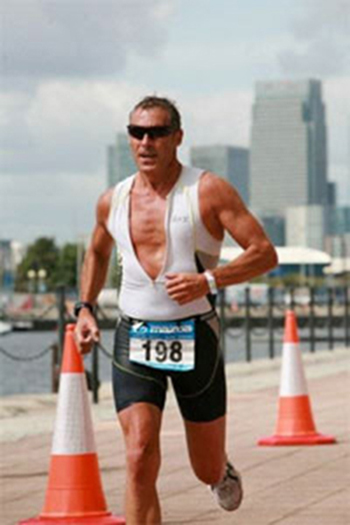
Nigel Strong
Occupation: Search Consultant & Life Coach
Primary Sport: Triathlon
“Otherwise peaking and tapering are just guesswork – when am I ready? With ithlete, I know when I’m ready to race.”
In the past, I had a couple of overtraining incidents: exhaustion, feeling obligation to train twice a day, not taking proper rest days, times got worse, and became susceptible to every illness out there. Psychologically, I was not even aware at the time that that is what’s happening. That’s where ithlete really becomes useful. ithlete says it’s okay to not to have a hard training session or take a day off. If you know you have put the training in, ithlete says rest up then you feel better the next day. My times are still getting better; in fact, I managed sub 2:30 over the Olympic distance at the London Triathlon.
This is now one of the most regularly used apps on my iPhone. I make sure I carry it around with me, especially when I’m traveling. What I really love about ithlete is that when I see a big drop, for instance to the high 60s, I can relate that figure to not feeling well, then watching it get higher (and feeling better) to the mid / high 80s. I normally listen to and follow the ithlete recommendation, but if I train when ithlete says I shouldn’t, my heart-rate during exercise goes up, and my performance decreases. The scientific side of ithlete is very interesting.
I had a coach a few years ago who said that a morning pulse rate change of 5 to 10 percent can indicate fatigue, But the ithlete app is more sensitive and uses charts and indicators. When you start to see the data in this form it starts to take on much more of a reality. Not only athletes, but ‘normal’ or non-athletic people could also use this! Prevention is better than cure.
I’ve used a Suunto T6 heart-rate monitor for running in the past, but now I tend to use the ithlete morning measurement as a barometer on what sort of training I need to do that day. I’ve even recently used it as an indicator for peaking and tapering recently. For example. I got a normal reading before a sprint distance event, and so I knew with confidence that I could really push myself hard. It felt great picking off competitors during the triathlon. Otherwise peaking and tapering are just guesswork – when am I ready? With ithlete, I know when I’m ready to race.
